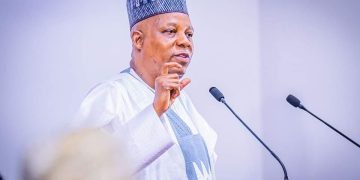Shettima defends govt policies: “We empathize with the poor but have no choice”
Amid the hardships faced by Nigerians, the Federal Government expressed empathy for citizens, particularly the poor.
During the 30th anniversary of the Nigerian Economic Summit in Abuja on Monday, Vice President Senator Shettima defended the current administration’s economic policies and outlined the government’s efforts to improve the economy.
“Some of the policy decisions, the policy options available are painful, but they are almost inevitable,” Shettima said.
“My heart and the heart of President Bola Tinubu go to the Nigerian people. We empathise with what the poor and the young are going through in the Nigerian nation but we have no option.
“Some of these decisions are unpopular but the truth is most often the truth that men prepare not to hear.”
Since taking office last year, President Bola Ahmed Tinubu has introduced reforms aimed at revitalizing the economy and attracting foreign investment.
However, since President Tinubu ended the fuel subsidy and floated the naira currency, Nigerians have experienced soaring fuel prices and inflation reaching a three-decade high.
Last Wednesday, the Nigerian National Petroleum Company Limited (NNPCL) raised pump prices from approximately 610 naira per litre ($0.38) to 855 naira or more.
Private suppliers have already been selling fuel at higher rates, with some charging up to 1,200 naira per litre on Wednesday.
The price increase followed NNPC’s admission that it was facing challenges in maintaining fuel supplies due to financial difficulties.
However, the vice president emphasized that the nation’s growth trajectory has been volatile, highlighting the economy’s heavy reliance on oil revenue.
“Like many other nations, Nigeria has experienced significant economic problems over the past few years. The challenges have been global as well as domestic, ranging from the COVID-19 pandemic and fluctuation of oil prices to internal security issues, inflation and structural weaknesses in our economy.
“Nigeria’s growth trajectory has been volatile, heavily dependent on oil revenue and unable to create enough jobs,” he said.
Follow the Neptune Prime channel on WhatsApp:
Do you have breaking news, interview request, opinion, suggestion, or want your event covered? Email us at neptuneprime2233@gmail.com





